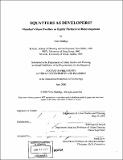| dc.contributor.advisor | Bishwapriya Sanyal. | en_US |
| dc.contributor.author | Mukhija, Vinit | en_US |
| dc.contributor.other | Massachusetts Institute of Technology. Dept. of Urban Studies and Planning. | en_US |
| dc.coverage.spatial | a-ii--- | en_US |
| dc.date.accessioned | 2005-09-27T19:28:38Z | |
| dc.date.available | 2005-09-27T19:28:38Z | |
| dc.date.copyright | 2000 | en_US |
| dc.date.issued | 2000 | en_US |
| dc.identifier.uri | http://hdl.handle.net/1721.1/8959 | |
| dc.description | Thesis (Ph.D.)--Massachusetts Institute of Technology, Dept. of Urban Studies and Planning, 2000. | en_US |
| dc.description | Includes bibliographical references (p. 191-201). | en_US |
| dc.description.abstract | This dissertation analyzes the slum redevelopment strategy introduced by the state government of Maharashtra (India) in its capital city, Mumbai (Bombay). The strategy involves demolishing the existing slums and building on the same sites at a higher density, new, medium rise apartment-blocks including entirely cross-subsidized housing for the original slum dwellers. Slum redevelopment is distinctly different from the two prevalent conventional strategies with respect to slums in developing countries - slum clearance and slum upgrading. Interestingly, the strategy appears to enjoy considerable support of slum dwellers, NGOs, private developers and politicians. The study focuses on a single slum redevelopment case - the Markandeya Cooperative Housing Society (MCHS) - to show how the state government amended the land development regulations to enhance the potential land values and allowed the slum dwellers to share in the high development values. This analysis of the role of the State in promoting a new housing strategy and providing crucial support in implementation contributes to our understanding of housing provision policy in three ways. First, it provides insights into slum redevelopment as an alternative housing strategy. It analyzes the problems faced and the solutions innovated in the implementation of this strategy. It argues that despite slum redevelopment's shortcomings, the strategy may be superior to other alternatives, especially if the State can provide implementation support. Second, it identifies nontraditional issues, often overlooked in housing improvement that may help make slum upgrading programs more successful. Contrary to the conventional focus only on private property rights, the dissertation argues for policy to be based on a differentiated view of property rights (including common property rights) that also considers the property values, the physical structure of the property-holdings and the interplay among these issues. Third, the study reveals the complexities involved in housing production for low-income groups and demonstrates that enabling housing provision, even with the participation of private sector agents, requires an active government role. Paradoxically, enabling may require four levels of seeming contradictions - both decentralization and centralization; both demand-driven and supply driven development; both private as well as public investment; and both deregulation and new regulations. | en_US |
| dc.description.statementofresponsibility | by Vinit Mukhija. | en_US |
| dc.format.extent | 201 p. | en_US |
| dc.format.extent | 21520816 bytes | |
| dc.format.extent | 21520573 bytes | |
| dc.format.mimetype | application/pdf | |
| dc.format.mimetype | application/pdf | |
| dc.language.iso | eng | en_US |
| dc.publisher | Massachusetts Institute of Technology | en_US |
| dc.rights | M.I.T. theses are protected by copyright. They may be viewed from this source for any purpose, but reproduction or distribution in any format is prohibited without written permission. See provided URL for inquiries about permission. | en_US |
| dc.rights.uri | http://dspace.mit.edu/handle/1721.1/7582 | |
| dc.subject | Urban Studies and Planning. | en_US |
| dc.title | Squatters as developers? : Mumbai's slum dwellers as equity partners in redevelopment | en_US |
| dc.type | Thesis | en_US |
| dc.description.degree | Ph.D. | en_US |
| dc.contributor.department | Massachusetts Institute of Technology. Department of Urban Studies and Planning | |
| dc.identifier.oclc | 47006229 | en_US |
